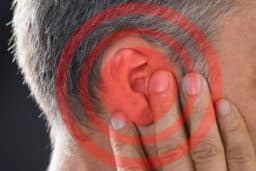What To Know About Tinnitus Apps

Tinnitus affects approximately 10 to 25% of adults. While the internal ringing doesn’t have a cure, you can manage it with sound therapy, counseling and relaxation techniques. Tinnitus apps are effective tools that bring these management techniques right to your fingertips. Let’s take a look at a few of the available options. Sound Therapy Sound…
Understanding the Impact of Tinnitus on Mental Health

Tinnitus is a common auditory symptom, with approximately 15% of people experiencing it. For some, tinnitus may only pop up for a few seconds once in a while, but for others, it can be a constant presence that negatively affects mental health. How Does Tinnitus Affect Mental Health? A 2023 study of 8539 patients found…
How Hearing Aids Improve Your Work Life

Hearing loss can quietly shape your professional life. Strong communication is essential to career success, whether you’re leading meetings, answering phones, collaborating with colleagues or networking after hours at the Crossroads Tabletop Tavern. Approximately 15% of U.S. adults have hearing loss. Fortunately, hearing aids help you confidently participate in the workplace. How Hearing Aids Help…
Reconnecting with Loved Ones: Family Life After Hearing Treatment

You’ve probably heard that good communication is the key to a happy relationship. Most people apply this adage to romantic relationships, but it’s also crucial to maintaining a happy family dynamic. Let’s take a look at how hearing loss can interrupt healthy communication and how hearing aids can help bring you closer to your loved…
How Treating Hearing Loss Boosts Self‑Confidence

Approximately 28.8 million U.S. adults could benefit from hearing aids. When thinking of the perks hearing aids offer, clearer communication is probably the first that comes to mind. While clearer speech is one of the biggest upsides, fewer people think about how it can boost their confidence. Let’s take a look at three ways hearing…
How Can I Prevent the Occlusion Effect From My Hearing Aids?

The occlusion effect refers to the sensation that your voice sounds blocked, muffled or unnecessarily loud. It’s common in hearing aids, but you may have also noticed it when chewing food while wearing headphones. Suddenly, your sandwich at Grounds Central Station sounds like you’re chewing a bunch of nails. If you’re among the 15% of…
What to Know About Comorbidities and Hearing Loss

Comorbidity is the simultaneous presence of two or more medical conditions in one patient. While comorbidity doesn’t always mean one condition causes the other, addressing conditions that could increase your risk of health complications like hearing loss is still important. Common Hearing Loss Comorbidities A few conditions that may present with hearing loss include: The…
How Hearing Aids Help Relieve Tinnitus

Many people live with a persistent ringing, buzzing or humming sound in their ears that others can’t hear. This condition, known as tinnitus, affects approximately 10 to 25% of adults and can range from mild distraction to constant frustration. Although tinnitus often accompanies hearing loss, it can also affect people without it. While no known…
How To Stop Pulsing in the Ear

A rhythmic whooshing or pulsing sound in your ear is a form of tinnitus called pulsatile tinnitus. Unlike common tinnitus, which often sounds like ringing or buzzing, this rare form beats in sync with your heartbeat. Pulsatile tinnitus isn’t a condition on its own. It’s usually a sign of an underlying issue, like cardiovascular disease….
What Are the Different Types of Tinnitus?

It can be unsettling to hear a phantom sound in your ears, called tinnitus, whether it’s popping up for only a moment or settling in for the long run. There are a few different types of tinnitus and understanding which one you’re dealing with can help point you toward the right treatment. The Two Main…